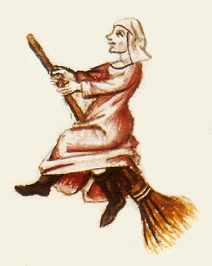La Befana vien di notte
La Befana is an old lady who brings toys to children in parts of Italy on Epiphany night. The Epiphany is when The Three Kings brought gifts to baby Jesus.
The legend is that on their way to deliver presents to Jesus, the Three Kings came across La Befana. They asked her to come with them, but she refused, saying she had too much housework to do. She later realized it had been wrong not to go with them. So she ran off with her broom in search of the Kings, bearing her own presents for the baby Jesus. But she never caught up to them. It's said that La Befana is still searching for the baby Jesus.
On Epiphany night, Befana goes around leaving presents for children, in imitation of the Three Wise men bringing gifts to Jesus. Befana looks like a friendly witch, with a mole on her face and in tattered clothes. She flies on a broom and goes down chimneys to deliver toys for the girls and boys.

La Befana vien di notte
The Befana Comes at Night
La Befana Rhyme
La Befana Rhyme
(Italian)
(English)
La Befana vien di notte
Con le scarpe tutte rotte
Col vestito da romana*
Viva viva la Befana!
The Befana comes at night
In worn out shoes
Dressed like a Roman
Long live the Befana!
Notes
*or "Col cappello alla romana" (same meaning)
The word "befana" comes from the Italian word "epifania", meaning Epiphany.
*****
Maria Sabatino-Cabardo sent us the following version of the rhyme from Roseto Valfortore, a little mountain town in Puglia:
La Befana vien di notte,
con le scarpe tutte rotte,
ai bambini piccolini, lascia tanti cioccolatini
ai bambini cativoni, lascia cenere e carboni.
Translation
The Befana comes at night
In worn-out shoes.
For the small, little children she leaves a lot of little chocolates,
For the bad little children, she leaves ashes and coal.
Comments
You can read more about La Befana in Italy on Mama Lisa's Blog. Feel free to join our discussion in the comments!


Thanks!
Thanks!
Thanks and Acknowledgements
Many thanks to Maria Sabatino-Cabardo for sending the alternate version of the rhyme.
Image: Flight of the Witches (Detail), Martin Le France, 1451.
Grazzie mille!
























